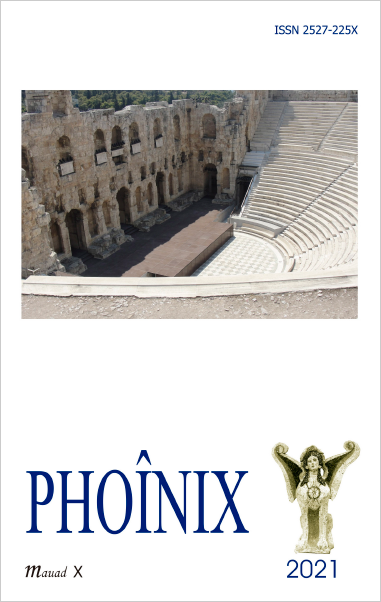THE ROMAN PEASANTRY IN VIRGIL’S AENEID
DOI:
https://doi.org/10.26770/phoinix.v27n1a6Palavras-chave:
historia romana, campesinado romano, guerra, Virgilio, Eneida.Resumo
The recollection of the wars that took place in Latium and their concrete consequences for the Italian peasant elite in particular and the Roman peasants and laborers in general, are elements the contemporary reader of Virgil must have recognized immediately in the form of allusions and references, while for us they appear veiled and demand an exercise of search and interpretation. As a citizen of Rome at the peak of its splendor, under Augustus’s rule, and as a poet from an Italian county, Virgil is an author that is sensitive to the wounds inflicted on the social body by different wars and he has poured his recollections and his version of history into his work as an act of memory and homage, not only for the heroes who fought for Rome but also for all the soldiers and anonymous peasants who returned to find their farmlands devastated. This work aims to focus on the references to the depopulation of fields in the Aeneid and to analyze them as an act of memory, that is to say, as something that creates a reading horizon for Virgil’s contemporaries who undoubtedly bring past wars to the present through one of their most influential consequences, the transformation of the Italian countryside and the peasant elite.
Métricas
Downloads
Publicado
Como Citar
Edição
Seção
Licença
Ao encaminhar textos à Revista Phoînix, o autor estará cedendo integralmente seus direitos patrimoniais da obra à publicação, permanecendo detentor de seus direitos morais (autoria e identificação na obra), conforme estabelece a legislação específica.
O trabalho publicado é considerado colaboração e, portanto, o autor não receberá qualquer remuneração para tal, bem como nada lhe será cobrado em troca para a publicação.
Os textos são de responsabilidade de seus autores. Citações e transcrições são permitidas mediante menção às fontes.
O uso dos textos publicados em nossa revista poderão ser distribuídos por outros meios, desde de que atribuídos devidamente à autoria e publicação. A revista está vinculada à licença CCBY-NC (atribuição não-comercial, conforme o Creative Commons).






































